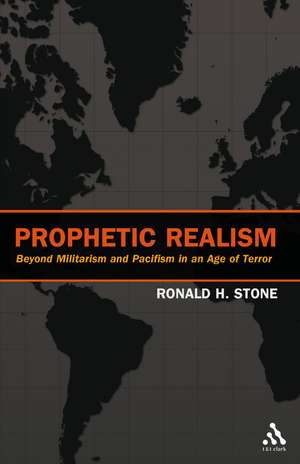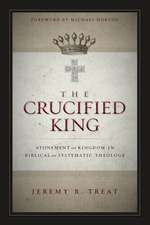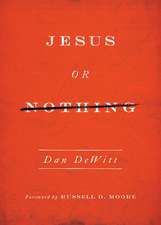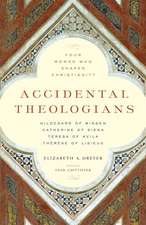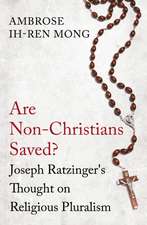Prophetic Realism: Beyond Militarism and Pacifism in an Age of Terror
Autor Ronald Stoneen Limba Engleză Paperback – 29 oct 2007
Preț: 183.51 lei
Preț vechi: 213.73 lei
-14% Nou
Puncte Express: 275
Preț estimativ în valută:
35.12€ • 36.46$ • 29.28£
35.12€ • 36.46$ • 29.28£
Carte tipărită la comandă
Livrare economică 22 martie-05 aprilie
Preluare comenzi: 021 569.72.76
Specificații
ISBN-13: 9780567026750
ISBN-10: 0567026752
Pagini: 208
Dimensiuni: 138 x 216 x 13 mm
Greutate: 0.26 kg
Editura: Bloomsbury Publishing
Colecția T&T Clark
Locul publicării:New York, United States
ISBN-10: 0567026752
Pagini: 208
Dimensiuni: 138 x 216 x 13 mm
Greutate: 0.26 kg
Editura: Bloomsbury Publishing
Colecția T&T Clark
Locul publicării:New York, United States
Caracteristici
1. Interest in Niebuhr remains strong. 2. Offers a significant theological response to terrorism and various political responses to terrorism. 3. Offers all this in a more affordable paperback version.
Cuprins
Preface: After 9/11 Chapter 1: Biblical Sources of Prophetic Realism Chapter 2: Historical Sources of Realism Chapter 3: The Development of American Prophetic Realism Chapter 4: A Perspective on International Politics Chapter 5: Ontology of Power Chapter 6: On Power and Purpose Chapter 7: Prophetic Realism and Peacemaking Chapter 8: Realist Criticism of Just Peacemaking Theory Chapter 9: Resurgent Pacifist Attack on Realism Chapter 10: Prophetic Realism, Human Rights, and Foreign Policy Chapter 11: Al Qaeda and U. S Foreign Policy Chapter 12: The Peacemaking Struggle and Resistance
Recenzii
"...Stone's interdisciplinary book makes an important contribution to current debates in theological ethics and international politics...Stone's project helps illuminate the challenges that American policies have obviated or neglected and would benefit specialists as well as upper-level undergraduate and graduate students." Jonathan Rothchild, Journal of Religion, July 2007
"The great strength of this book is the clarity author Ronald Stone brings to the meaning, history, and theological importance of the tradition of prophetic realism. "-Jeffrey W. Robbins, Journal of Church and State, April 10, 2008
Reviewed in Evangelical Review of Society and Politics.
"Stone's book is an excellent source for the history of the relatioship between American secular politics and theology over the last one hundred years. To the European reader, it is exciting to see ways in which theology can coherently and successfully engage withpolitics in the public sphere" International Journal & Public Theology
Reviewed in Religious Studies Review, Vol. 36, No. 2, June 2010 (UK) 'His thesis is clearly and passionately argued, an example of applied religious ethics ... this book is accessible to clergy, laypersons and scholars alike.'
Ronald Stone is that rare intellectual who is at home in the discussions both of Christian theology and of international relations. This book, with its persistent interaction between the two realms, is a double challenge: to churches who are often naïve and dogmatic in moral judgments about world affairs, and to those politicians and political scientists who ignore the ethical meaning of their judgments. It is particularly relevant in the post 9/11 era, when many past certainties are insecure. -Roger L. Shinn, Reinhold Niebuhr professor emeritus of social ethics, Union Theological Seminary, New York
"The great strength of this book is the clarity author Ronald Stone brings to the meaning, history, and theological importance of the tradition of prophetic realism. "-Jeffrey W. Robbins, Journal of Church and State, April 10, 2008
Reviewed in Evangelical Review of Society and Politics.
"Stone's book is an excellent source for the history of the relatioship between American secular politics and theology over the last one hundred years. To the European reader, it is exciting to see ways in which theology can coherently and successfully engage withpolitics in the public sphere" International Journal & Public Theology
Reviewed in Religious Studies Review, Vol. 36, No. 2, June 2010 (UK) 'His thesis is clearly and passionately argued, an example of applied religious ethics ... this book is accessible to clergy, laypersons and scholars alike.'
Ronald Stone is that rare intellectual who is at home in the discussions both of Christian theology and of international relations. This book, with its persistent interaction between the two realms, is a double challenge: to churches who are often naïve and dogmatic in moral judgments about world affairs, and to those politicians and political scientists who ignore the ethical meaning of their judgments. It is particularly relevant in the post 9/11 era, when many past certainties are insecure. -Roger L. Shinn, Reinhold Niebuhr professor emeritus of social ethics, Union Theological Seminary, New York
